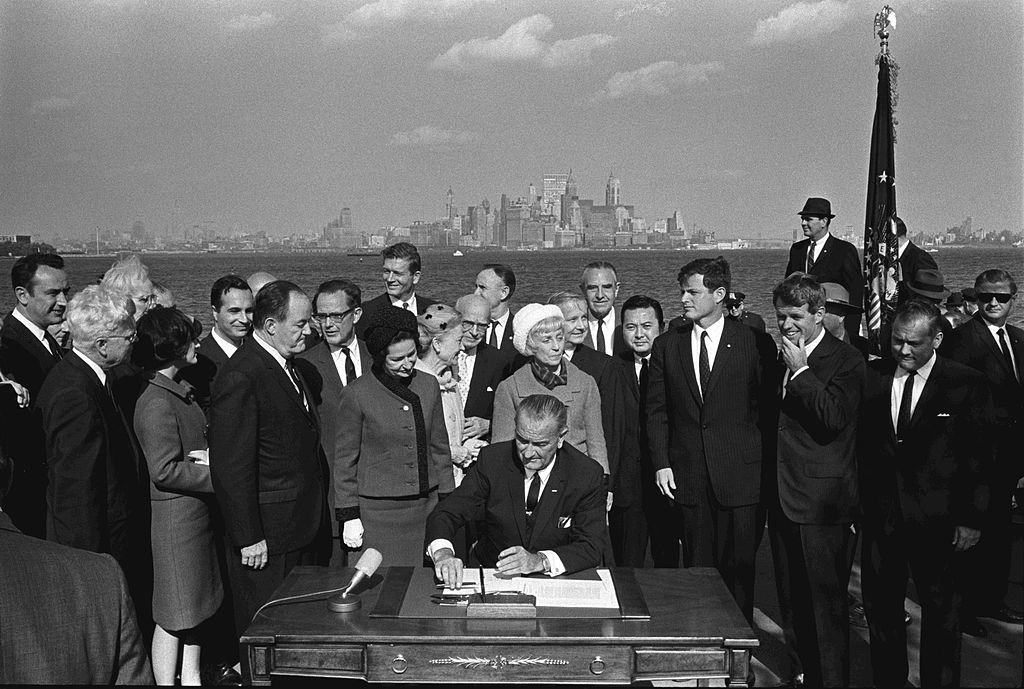Hillary stands with Latinos, apparently. She wrote an op-ed declaring her solidarity with Latinas/os and she tweets in Spanish.
But, there is still a problem with Hillary’s message. Her historicity is unmoored which allows for the creation of a happier, rosier, kinder story of the nation. Instead of delving into the complicated, controversial American past, she provides an exceptionalist vision of America that is misremembered to explain why America has been great, why America is great, and why America will be great in the future. She writes:
Will we continue to be a country that is proud of our immigrant heritage? That continues to welcome the struggling, the striving, and the successful to our shores? That continues to offer unparalleled opportunities and freedoms to all? Or will we make among the biggest mistakes we could by turning our backs on the world and allowing hatred to turn into policy?
According to Clinton’s history, America has loved immigrants, does love immigrants, and will love immigrants in the future. The rise of nativism and xenophobia is the product of a few candidates, a small percentage of the population, and, in particular, one party. Anti-immigrant sentiment is an inconsistent blip, a confused mixture of words and ideas. Its incongruity in the American past and future frees the American present from culpability.
While immigration has certainly played a key role in U.S. history, the nation has not necessarily welcomed immigrants with open arms. More realistically, we are a nation of immigrants that has hated immigrants. From the Irish in the middle of the nineteenth century to the Mexicans today, Americans have socially marginalized immigrants. In 1924, tired of the waves of immigrants coming to the U.S., Congress passed laws that would limit the flow of immigrants to the country based on racially exclusive quotas. The Johnson-Reed Act worked. Between 1924 and 1965, the stream of immigrants from Europe, Latin America, and Asia was reduced to a trickle. Yet, the U.S. solicited Mexican workers from 1942 to 1964 with the Bracero Program, a guest-worker program that came only two years after a decade-long program of forced deportation of Mexican and Mexican-Americans. While the Bracero Program was supposed to limit the number of workers and provide them protections, it failed at both. Authorities and agricultural employers in states like Texas ignored the protections called for in the binational agreement and paid workers as little as half the determined salary. In 1954, the government started a nationwide campaign to deport Mexican workers who sought autonomy outside of the confines of the program, called Operation Wetback. The campaigns were meant to crackdown on criminal elements in the Southwest, punishing poor workers and not employers for breaking federal laws.
Immigration policies have pushed communities of color—primarily Latinos and especially Mexicans— to the fringes, even in the post-1965 liberal era of immigration policy. While the racial quotas have been removed, immigration policy is still aimed at disciplining, policing, and interdicting immigrants of color while not providing a legitimate means of movement. Starting in the early 1990s, programs like Operation Hold the Line and Operation Gatekeeper blocked previous corridors of migration through El Paso/Juarez and San Diego/Tijuana. By blocking urban crossings and militarizing the border, authorities intentionally pushed migrants into the Sonoran desert with the belief that the life-threatening dangers would dissuade them. Sadly, it did not and migrants died in the desert. Policies like Proposition 187 in California in 1994 tried to deny immigrants basic services, pushing them further into the shadows and margins.
Today, immigrants are condemned for the cultural diversification of the U.S. Politicians and others blame them for the balkanization of the U.S. Increasingly, multiculturalism has been attacked (it has been attacked in Western Europe, as well). Many people believe that ethnic differentiation causes national disintegration. English only laws continue to gain support. Former vice-presidential candidate, Sarah Palin, urged immigrants to “speak American.” Donald Trump and other presidential hopefuls have recently tripped over themselves in support of English only.
This shows that prejudice as a political force is not inconsistent in our democracy. It has shaped policy and has served as the foundation for party platforms. Hillary Clinton and other politicians must acknowledge our difficult history, instead of dismissing its lasting ideological and political influence. Politicians need to finally recognize that paeans to our shared immigrant past are no longer sufficient. We need humane policy, not platitudes.




Wow, I love your commentary. What can we do to help out, this is so true.